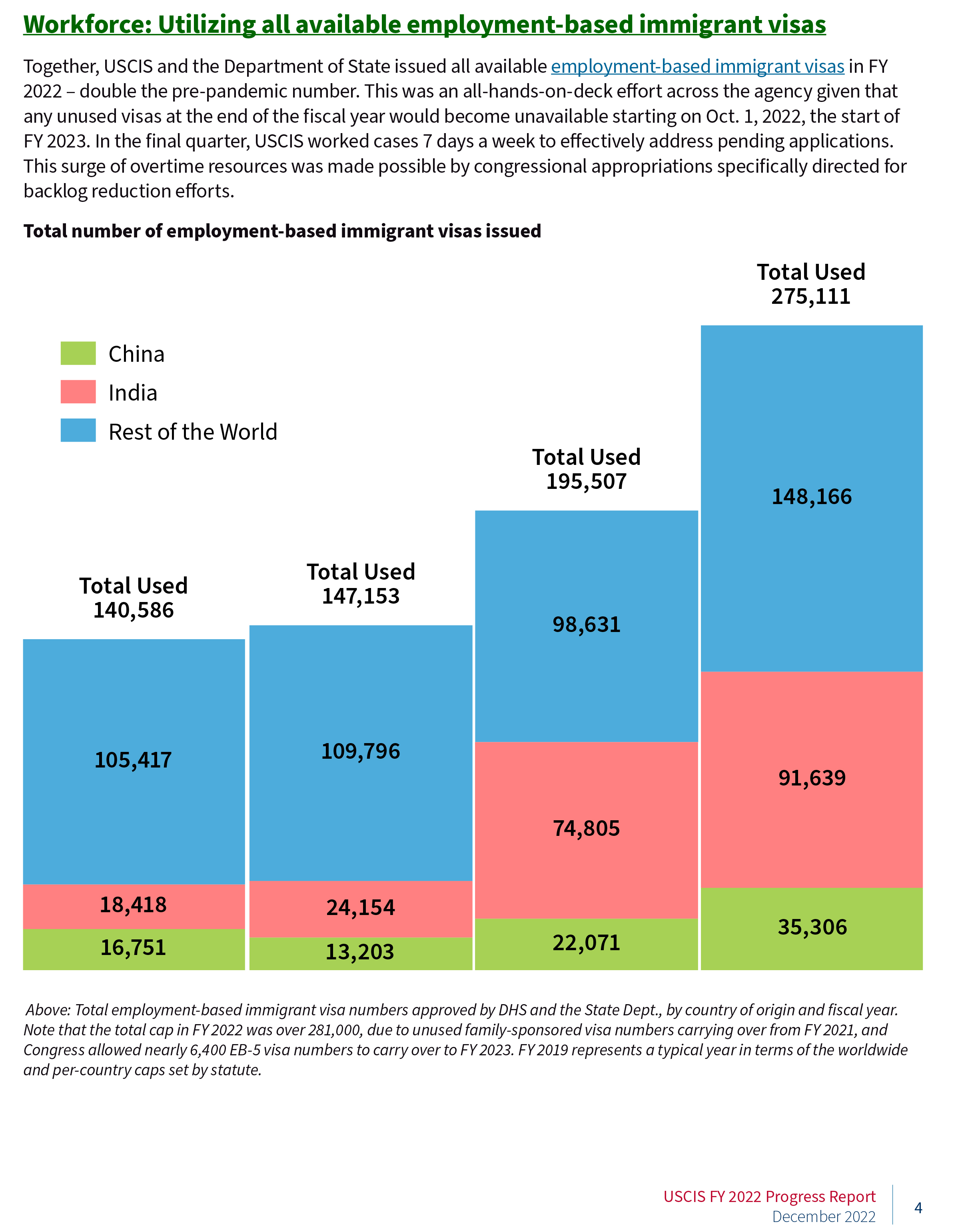H-1B Promotion in 2022 | Will This Impact My Green Card & I-140
One of the many benefits of having an H-1B visa is the flexibility it brings to your work in the U.S. From its portability to the ability to work toward your green card, it’s no wonder why so many people petition for this competitive visa each year. If you have recently gotten or are scheduled to get an H-1B promotion within your company, here are some things you should know about how it affects your nonimmigrant status as well as your green card.
Getting an H-1B Promotion
If you are fortunate enough to receive a promotion while on H-1B status, you will need to find out if a “material change” has taken place in order to determine if an action needs to be taken. A material change means that the job duties have changed significantly and this change requires the use of skills or education that were not required for the position you had when you petitioned. If this is the case, you will need to file an H-1B amendment to your petition.
Learn more about employment-based green cards.
However, this amendment is sometimes erroneously filed. Here are some instances in which your employer would not need to file:
- The promotion is routine and still requires the same skills and education as the previous position.
- Your salary has increased along with the promotion.
- The company’s name has changed but functions the same (though filing an amendment is recommended in this case)
- There has been a company acquisition or merger in which the new management agrees to the same H-1B terms as the previous employer.
- You have been transferred from your current branch to a different one. (However, you should file an amendment if you are transferred to a new entity within an organization and the new entity becomes your employer.)
- You are temporarily visiting a new location or client location that is different from the location specified in your LCA.
The important thing to remember is the Labor Condition Application (LCA). An LCA will need to be filed if your job duties are no longer in line with what your LCA states. If this is the case, you will need to file an amendment for your H-1B promotion. Also, if your promotion means that you are being transferred permanently to a location that has a different prevailing wage than what was originally stated on your LCA, then it is recommended that you get an H-1B amendment.
It’s usually better to be safe rather than sorry. Filing an H-1B amendment may be a hassle, but it could save you from being out of status, which could have serious consequences on your future immigration opportunities. Your attorney will be able to differentiate between scenarios that warrant an amendment and those that do not.
How Promotion Affects Your Green Card
Another great benefit of the H-1B visa is the fact that you can pursue a green card. However, once you have begun the process of applying for permanent residence, what happens with your H-1B will affect your green card as well.
If your current H-1B employer is the same one that is sponsoring you for your green card, then you should take a look at the green card requirements before making any drastic position changes (i.e. accepting an H-1B promotion). If your new position falls outside of the parameters for your green card, your immigrant petition could be denied.
Promotion After I-140 Approval
If you get a promotion that makes a material change to your H-1B position, it may be best to bring it to your immigration attorney to decide if a new Form I-140 should be filed for your green card. Don’t worry, you can request to have your original priority date retained so that you don’t have to start the waiting process over again. For this reason, not every promotion that you receive while on an H-1B visa will require an amendment and a new I-140. In many cases, if your salary or your title changes – this won’t affect your status because this won’t necessarily affect your job duties. Below are the situations where you will not need an H-1B amendment:
- If your worksite changes but you are still in the same metropolitan statistical area (MSA).
- If your workplace changes to the outside of MSA for less than 30 days. For example, during short-term work placements.
- If there is a change in the name of your employer.
- If there is a change in the corporate structure of your employer and a new successor-in-interest.
Green Card Porting
In a similar way, your H-1B promotion may put you in line to “port” your green card petition to a higher preference level. However, “porting” is a bit of a misleading term, since you will need to start again from square one. The only difference is, like mentioned earlier, you can retain your priority date from your first petition.
If, for example, you were an H-1B holder with an I-140 petition on file for an EB-3 green card, you would be able to apply for an EB-2 green card only if:
- You gained the qualifications necessary for EB-2 eligibility and;
- You gained a new position that requires your new qualifications either through an H-1B promotion or by getting a different job.
The second component is important. Just because you got your master’s degree while you were waiting for your EB-3 priority date to be current doesn’t automatically mean that you can apply for an EB-2. You must also secure a new position that reflects the need for that master’s degree. If your new H-1B promotion requires advanced education and you get that degree, you may be eligible.
If this is the case, then your green card sponsoring employer (whether it’s your H-1B employer or a new one) must file a new PERM on your behalf (unless you are applying for an EB-1 or EB-2 with a National Interest Wavier). Then, that employer must also file another I-140 in the new preference level while marking the request to retain your priority date. To do this correctly the first time, it is always best to seek the services of an experienced immigration attorney.
More About H-1B Visa
Let’s start with a brief overview of how the H-1B visa works. Because the immigration process is a very precise and delicate system, you need to be well aware of all the requirements and specifications before making any major changes.
As you likely already know, the H-1B is a nonimmigrant visa designed for foreign workers in specialty occupations, meaning that this position places a great deal of emphasis on the exact position you are occupying while in the U.S. The regulations state that your position must require the use of a relevant bachelor’s degree and that you must have such a degree in order to qualify.
If you are eligible, your employer must file an I-129 petition on your behalf and enter it into the annual H-1B lottery (unless, of course, your petition is cap-exempt). If your petition is accepted and subsequently approved, then you’ll be issued your visa. However, the work doesn’t end there.
H-1B Portability
As we mentioned, the H-1B is a very versatile visa, allowing you to work full or part-time, work for several different employers at once, and transfer your status from one employer to the next. However, for this last action, your new employer will need to file a new petition on your behalf (don’t worry about the lottery–once you have been counted toward the cap, you can’t be counted again).
On the other hand, if you get an H-1B promotion while under the same employer, you may need to take a different action.






